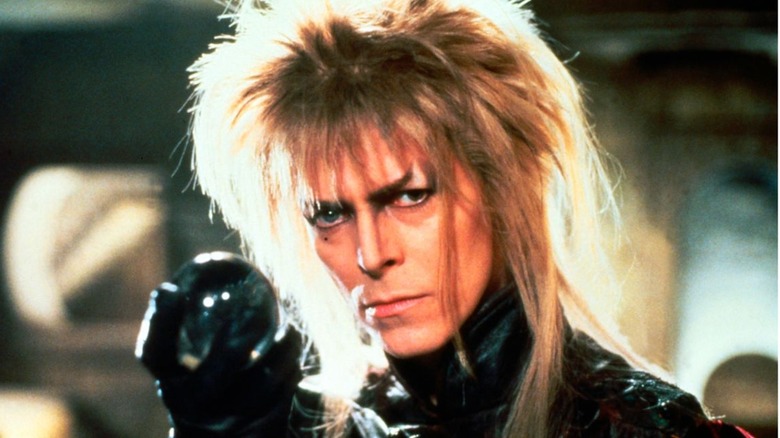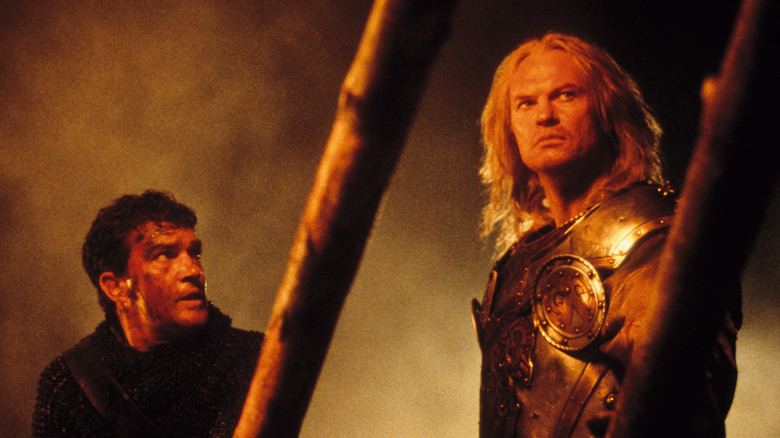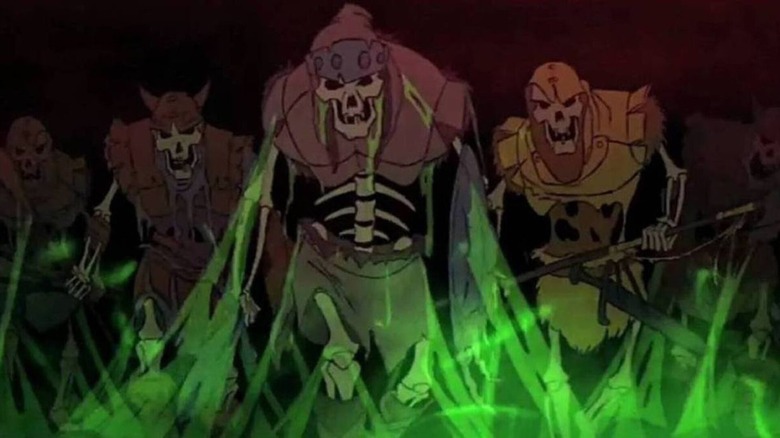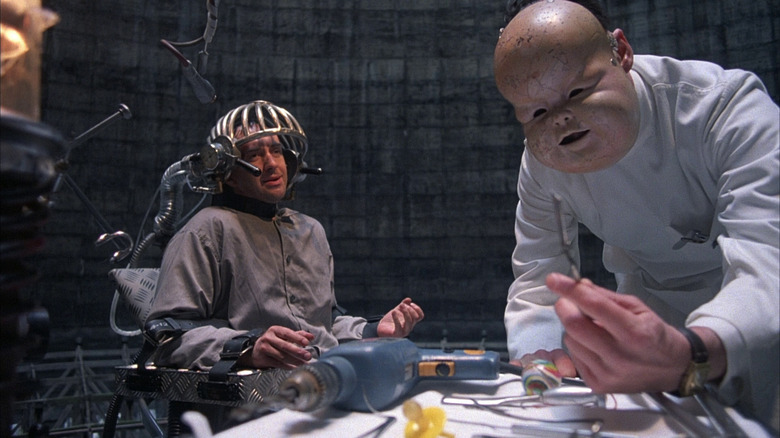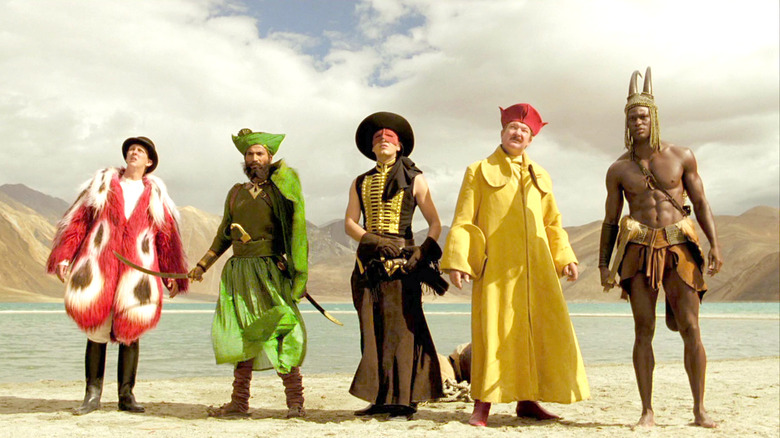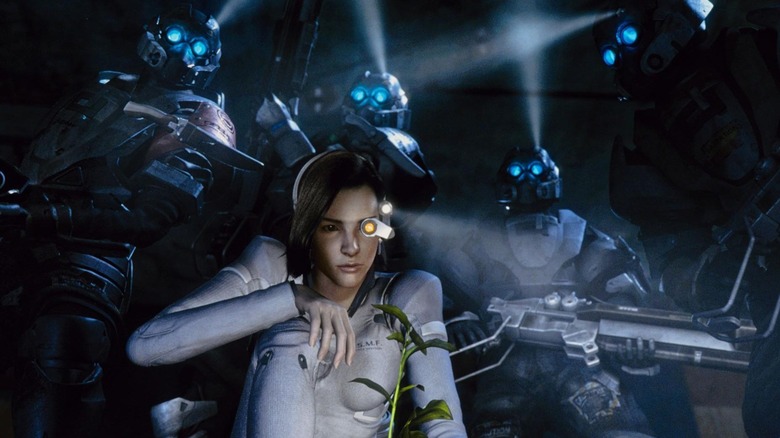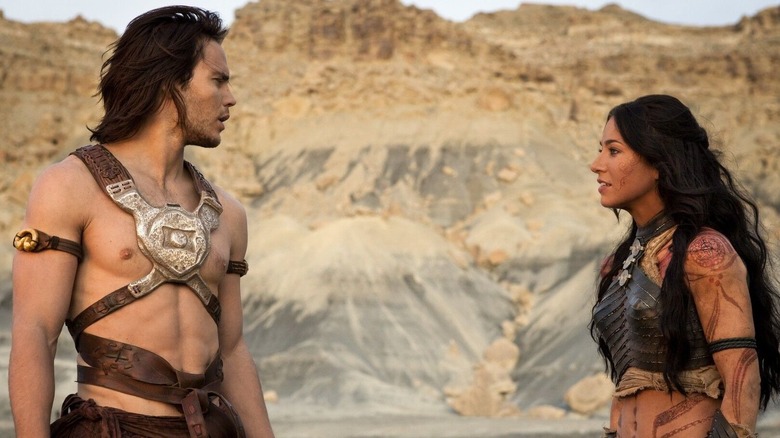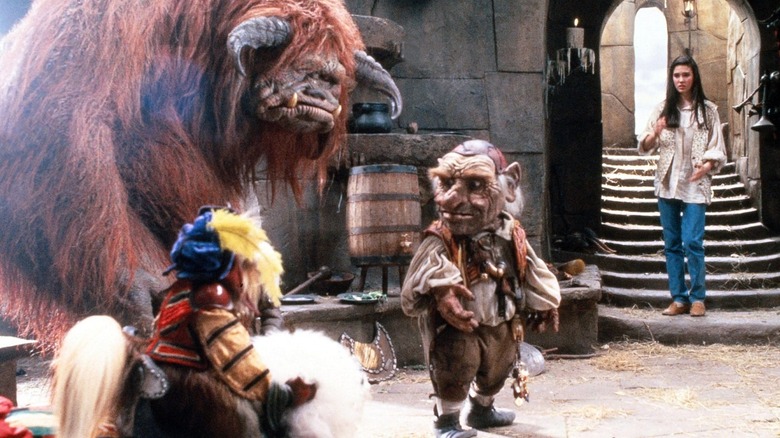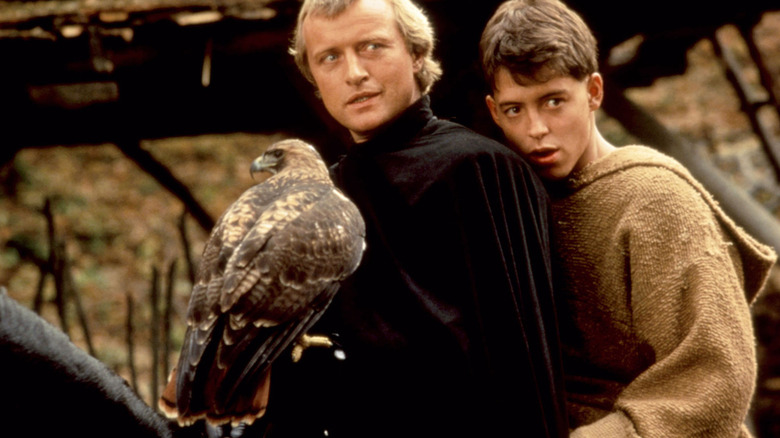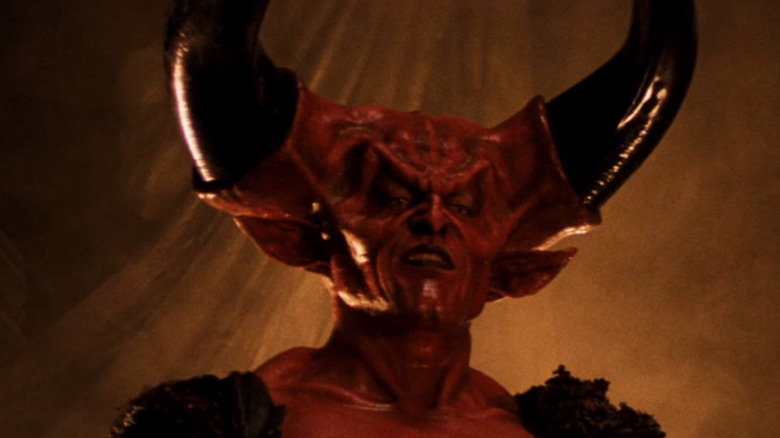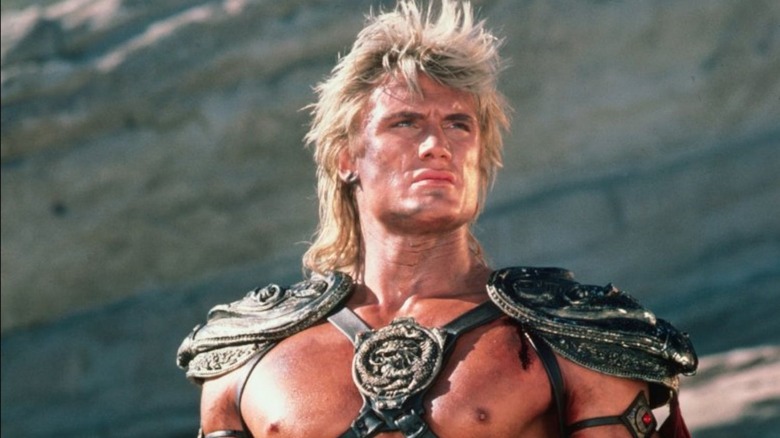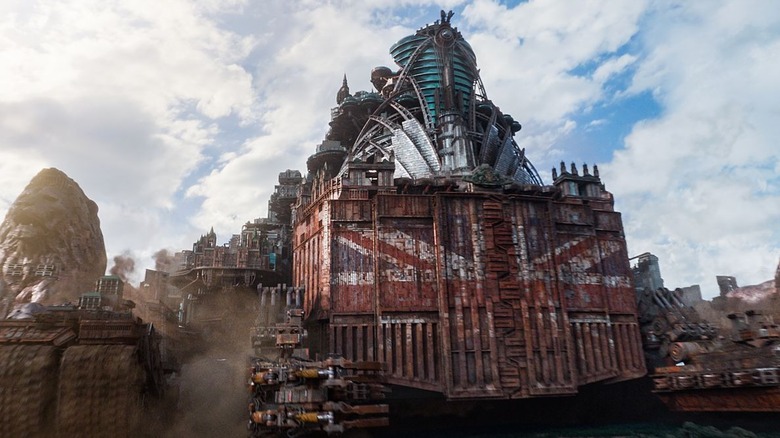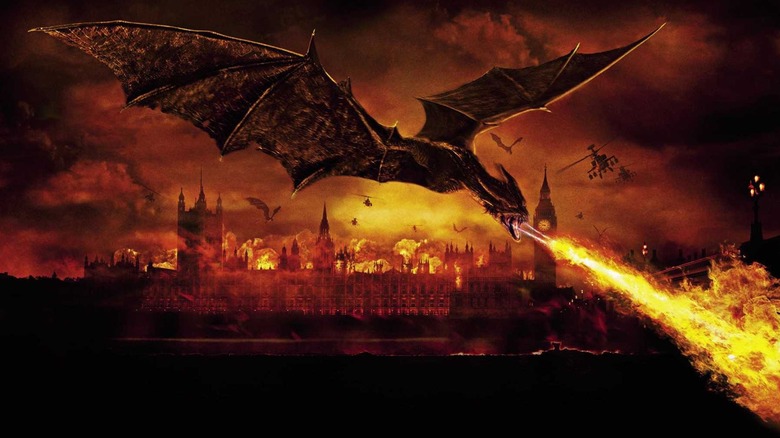Fantasy Box Office Bombs That Deserve A Second Chance
Fantasy films aren't released every day. The genre is not in as dire straits as, say, westerns or musicals, but fantasy is certainly a bit of an endangered species — or, at the very least, a genre in decline.
Fantasy relies on extensive world-building and frequently dabbles in magic, curses, and alternative histories. Dragons, fantastical creatures, and visual spectacle are mainstays of the genre; technology is usually set aside. Perhaps for these reasons, fantasy films tend either tend to be blockbusters or cult hits, consumed only by a niche audience. What's really fascinating, though, is how many beloved fantasy films were absolute disasters when they debuted (the '80s were particularly unkind to the genre).
That's why it's worth revisiting the fantasy films that didn't perform all that well upon their initial release. The films on this list bombed, but most are now considered absolute classics. They're more than worth a second look. And yes, there's a mix of everything on this list, proving that fantasy truly does have something for everyone: action, camp, romance, and, yes, even Taylor Kitsch.
The 13th Warrior
Audiences collectively shrugged and immediately moved on when the adaptation of author Michael Crichton's novel "Eaters of the Damned" debuted. The text is a loose adaptation of "Beowulf," in which an exiled warrior is recruited by Norsemen to fight an ancient evil. In fact, the villains of the piece are actually a group of humans who have regressed to the point that they live and act like bears, feasting like cannibals on human flesh.
The film had an incredibly troubled production history, with Crichton taking over on reshoots for celebrated action director John McTiernon when the initial cut was poorly received by test audiences. Extensive reshoots not only delayed the film, but caused the budget to balloon. By the time that "The 13th Warrior" arrived in theatres in 1999, it was virtually impossible for the finished product to recoup its budget.
What audiences have come to realize is that the action fantasy is incredibly stylish and that Banderas fully commits to his arc as Ahmad ibn Fadlan grows from disgraced outcast to capable warrior. There's also one key scene, a rarity in any foreign or historical film, in which Ahmad stays up all night listening and learning the Viking language so that, following a montage, he is able to communicate with his new tribe. It's patently ridiculous and conveniently expedient, but at least "The 13th Warrior" takes the time to justify its move away from silences and subtitles. It's a small but unique moment in a well-shot, atmospheric, and adrenaline-pumping action fantasy film that speaks volumes about the film's attention to detail.
The Black Cauldron
"The Black Cauldron" is either a blemish or a badge of pride for Disney Animation. It's a film that heralds the end of an era of a certain kind of animation at the Mouse House: The failure of the Welsh tale marked a shift away from dark (read: scary and less child-friendly) material before the company pivoted to become the hit factory that released "The Little Mermaid" in 1989 and "Beauty and the Beast" in 1991. For some, the 1985 film is the end of Disney's willingness to tackle risky, less popular fare.
"The Black Cauldron" still bears the hallmarks of classic Disney animated films: A normal boy must embark on a hero's journey to discover what he's capable of, forging true friendships and learning the meaning of responsibility along the way. Unlike many other Disney films, however, the film boasts several frightening and disturbing scenes, including the sequence in which the Horned King's "cauldron born" army are birthed, and the moment when plucky sidekick Gurgi sacrifices himself to save the world.
Despite the near economic ruin that the animated feature brought on the Mouse House, "The Black Cauldron" has collected a number of fans over the years. In part, this is because Disney didn't release the film on home video for more than a decade after its release, making it something of a collector's artefact. As the film that nearly ruined Disney, "The Black Cauldron" has a notorious reputation, but if fantasy fans gave it a chance, they will find that it's actually a beautiful, well-made (albeit dark) relic of a bygone era.
Brazil
Terry Gilliam's work has never been popular, so the celebrated, quirky auteur's filmography could populate an entire list of ambitious fantasy films that flopped all on its own. But while "Time Bandits," "The Adventures of Baron Munchausen," "Tideland," and "The Imaginarium of Doctor Parnassus" all belong here, none of Gilliam's other films have the legacy of "Brazil".
The darkly funny dystopia starring Jonathan Pryce is, first and foremost, immaculately conceived and executed. A loose adaptation of George Orwell's "Nineteen Eighty-Four" mixed with elements of Kafka and absurdism, "Brazil" is a sharp critique of a totalitarian dictatorship plagued by inefficiencies. Like most Gilliam films, its visuals are delightfully kooky and memorable.
Among its most famous fantasy sequences are Pryce's Sam Lowry dreams of flying around the city. They're striking and romantic, both of which are broad descriptors that could be liberally applied to most sections of this cult favorite. Of course, a film as wildly original as "Brazil" was doomed to flop, but thankfully it has no less than two different cuts on an immaculate Criterion Collection release to help ensure that its legacy lives on.
The Fall
"The Fall" is one of those films where, if you look solely at the financials, it is indisputably a bomb of epic proportions. Digging into the details, however, the film never stood a chance, thanks to its unusual release. The sophomore film by Tarsem Singh, the visionary director of "The Cell," debuted at prestigious film festivals in 2006, then sat on the shelf for two years, before it quietly released into just over 100 theatres in the US and UK. Little wonder it lost so much money.
"The Fall" is an elaborate fable about storytelling told through the eyes of a little girl who is listening to a wounded man (Lee Pace) in a hospital. For new viewers, there is often a disconnect between the visuals and the narrative, the latter of which frequently takes a back seat to the heightened fantasy sequences. Audiences who can overcome this are in for a treat, though, as Singh uses the film like a visual playground, filled with dream-like iconography and opulence.
"The Fall' is both a passion project (Singh self-financed the film) and an ode to the vast, rich vibrancy of the world (evident in the more than 20 countries the film shot in). It's a gorgeous mood piece that leans into emotion and awe, which would've been a hard sell even if the film had been more widely available. However, if you're willing to forgive the thin story, "The Fall" is both beautiful and completely unforgettable.
Final Fantasy: The Spirits Within
"Final Fantasy: The Spirits Within" didn't charm fans of the video game series, which bears the same name and a lot of the same theology as this film, but is otherwise very, very different. The stand-alone attempt to expand the property's appeal was such a disaster that it notably bankrupted an entire studio.
Like several other titles on this list, the failure of "Final Fantasy: The Spirits Within" is partially due to fiscal mismanagement. The 2001 release featured state of the art computer-generated characters modeled off its human voice cast, lead by "ER" and "Agents of S.H.I.E.L.D." actress Ming-Na Wen, which made for eye-popping photorealistic effects, but caused the production budget to balloon exorbitantly. While the studio undoubtedly banked on the IP of its famous source material, the original narrative garnered mixed reception and the film never crossed over to general audiences, who gave it the cold shoulder.
It's disappointing because not only is the finished product vivid and striking, the film's plot — about an earth under siege from vengeful ghosts angered by environmental destruction — has only become more relevant. There's a humanist bent to "Final Fantasy" that is utterly Eastern in its sensibilities, and while it didn't connect with North American audiences, there's never been a better time to be swept away in the film's important, timely message.
John Carter
This one hurts. Disney thought that they had the next "Star Wars" lined up when they tapped Oscar-winning animator John Stanton to direct his first live-action feature. The property in question is based on a renowned text, the first book in Edgar Rice Burroughs' long running Barsoom series, "A Princess of Mars" (first published in 1912). Throw in acclaimed novelist Michael Chabon as screenwriter and hot up-and-coming actor Taylor Kitsch ("Friday Night Lights"), and all signs pointed to extravagant profit.
The most frustrating thing about the colossal failure of "John Carter" is that it's legitimately enjoyable. The film convincingly balances the awe of discovering a whole new world with a rousing dose of action. It's a film that should appeal to all four quadrants, particularly families with and young men. And yet...
One frequent quibble about "John Carter" is that the FX work doesn't stand up. Some creatures and sequences look cartoony, as though Stanton and his team can't quite bridge the gap between animation and live action. Still, as an example of what could have been, "John Carter" is far better than naysayers give it credit for. It's a genuinely fun, enjoyable fantasy film that deserved better.
Labyrinth
Sure, it's a beloved children's film, but it's also the film with the codpiece that confirmed the sexuality of a lot of queer boys.
Joking (well, half-joking) aside, considering the legacy it left behind, it's baffling that "Labyrinth" was a flop. And yet, the Jim Henson-directed film about a sister (the divine Jennifer Connelly) who must venture through a maze full of puppets to recover the baby brother she accidentally bequeathed to the Goblin King (David Bowie) was not a success when it was released in the late '80s. What has gone on to become one of the most celebrated YA texts in film history barely earned back half of its production costs upon its initial release.
Perhaps it's the combination of actors, puppets, and fantasy that's the sticking point (see also: "Legend"). Whatever the case, "Labyrinth" has rightfully been reclaimed by audiences who love its archetypal hero's journey, its wacky cast of memorable Henson creations, and Bowie's well-endowed antagonist. Bonus points if this entry reminds you of the babe.
Ladyhawke
When you consider the talent involved in "Ladyhawke," it's shocking that the film didn't even break even. It's directed by Richard Donner, the man behind "Superman", and its central trio is Matthew Broderick (two years after "WarGames", which also starred John Wood), Michelle Pfeiffer (two years after "Scarface"), and Rutger Hauer (three years after "Blade Runner" — which, admittedly, was also a huge flop). This wasn't a cast of unknowns.
The failure of "Ladyhawke" is all the more disappointing when you consider how seamlessly the film blends its fantasy elements with its swoon-worthy romance. Initially, "Ladyhawke" seems to be about the Mouse (Broderick), a thief with the skills of an escape artist. In reality, though, "Ladyhawke" is about the everlasting love between Etienne of Navarre (Hauer) and Isabeau (Pfeiffer), who are doomed to spend their lives as different animals because they were cursed by the petty Bishop (Wood), who was jealous of their love.
In the film's most heart-breaking scene, Navarre and Isabeau reach for each other just before dawn in the one moment when they are both in human form. Donner and cinematographer Vittorio Storaro shoot the sun as though it carries doom, a ticking clock as the lovers try — and fail — to touch before Isabeau transforms. It's haunting, emotional and wonderful all at once, a perfect encapsulation of the ability of "Ladyhawke" to evoke the triumph and pain of love.
Legend
In another time, a Ridley Scott joint starring Tom Cruise would have been a guaranteed blockbuster. As it is, the timing was simply wrong for "Legend," the Biblical fantasy about a boy's quest to save his love before she's corrupted by Darkness.
To say that "Legend" is gorgeous is an understatement. The film is filled to the brim with visual splendor; it has a lush aesthetic so vivid that you can nearly feel it with your eyes. A young Cruise, well on his way to becoming the megastar he is after back to back hits "All The Right Moves" and "Risky Business," is charming and winsome, while Mia Sara, in her feature debut, is so resplendently beautiful that it makes her status as a damsel in distress slightly more forgivable.
If there's only one reason to seek out "Legend," though, it has to be Tim Curry's sublime performance as the film's antagonist. The veteran actor delivers what is quite possibly the best take on a devil in cinematic history, armed with truly iconic make-up and prosthetics that have stood the test of time. Being tempted by Darkness has never been this sexy or seductive.
Masters of the Universe
Bear with me on this one: I am well aware that the "He-Man" live action film is a wild choice. The truth, however, is that "Masters of the Universe" is a surprisingly enjoyable film.
My rationale is twofold: One, it's been nearly 25 years since the film debuted in theatres back in 1987, and expectations have adjusted accordingly. Two, it's fun as hell to watch celebs like a pre-fame Courteney Cox, as well as Frank Langella and Meg Foster, camp it up. Sure, "Masters of the Universe" was not supposed to be a riotous schlock-fest, but between the hovercrafts, its enthusiasm for fried chicken, and its dogged self-seriousness, the film is actually kind of a blast. The questionable plotting (why is so much of the film set on Earth?) and the slow pace are issues, but viewing this as the first installment in an anticipated franchise (which obviously didn't happen) makes you appreciate just how hard the film is going.
"Masters of the Universe" is a messy, convoluted, ambitious film that doesn't have any of the finesse or polish that audiences expect from contemporary blockbusters — and it's better for it. There's delight to be found in the aggressively '80s aesthetics, the outrageous action set pieces (the music store showdown is basically a western standoff) and the great costuming (Langella's Grayskull mask is a thing of beauty)."'Masters of the Universe" isn't good, but as a campy romp, it gets the job done.
Mortal Engines
Look, no one is confusing "Mortal Engines" for high art. The film adaptation of the first book in Philip Reeves' quadrilogy of dystopian YA novels was the kind of high-concept fantasy that should have worked. Unlike other failed attempts — Duncan Jones' "Warcraft," for example – this film has action sequences that evoke past swashbuckling successes like "The Mummy" (1999) and "Pirates of the Caribbean." It also has a star-studded adult cast that includes Hugo Weaving and pretty decent looking visual effects (the true deal-breaker, if we're being honest).
It's the marketing that doomed the film, which relied too heavily on shots of giant cities on wheels. Audiences had no idea how clever the premise — a world where natural resources are so scarce that leaders literally put metropolis on wheels and race around consuming the city's rivals — actually is. There's a less-than-subtle class critique in the way that the big cities gobble up the smaller cities, as well as how residents within the cities are separated by caste.
Alas, "Mortal Engines" was a case of trying to capitalize on the dystopian YA trend a few years too late, with a confusing marketing campaign and a budget that was nearly impossible to recover. Now that the film is widely available, however, there are far worse ways to kill an evening.
Reign of Fire
Full confession: On a first watch, "Reign of Fire" can be underwhelming. It has a grim, stark color palette (do you like grey and brown? Here, have an hour and 42 minutes of it) and the post-apocalyptic London setting is more depressing than it is memorable. Hell, even stars Matthew McConaughey and Christian Bale seem to be suffering through the film like it's a torturous slog.
And yet on subsequent rewatches, it's clear that "Reign of Fire" is an audacious anti-Hollywood action film. Screw your likeable characters and normal-sounding names! In a world like this, it seems totally plausible that people would be mopey like Bale's Quinn Abercromby or bald and unlikeable like McConaughey's villainous Denton Van Zan. And yes, with the constant threat of everything being burned to ruin, the world might conceivably be reduced to two different colors of ash.
One element that has never needed changing is the wonder and scope of director Rob Bowman's dragon sequences. If a young boy was given a $60 million check and told to make a dragon movie with state of the art effects, "Reign of Fire" is pretty much exactly what you would get. It's loud, dumb, fun, and frequently very exciting. Just sit back and revel in the fiery sky carnage.
